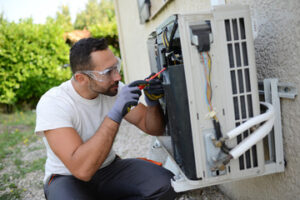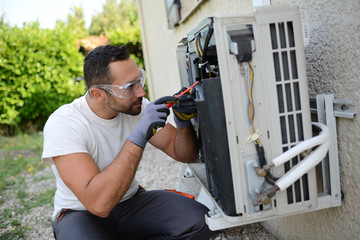Air conditioning installation involves a variety of factors. It includes ductwork and other specialized equipment and may require an upgrade to your electrical service panel.
A professional All Temp Air Conditioning & Refrigeration team will make sure all components fit and function according to manufacturer specifications. This prevents future problems and helps the equipment run as efficiently as possible.

Size
Whether you’re replacing an old system or installing a new one, the size of the unit is an important factor to consider. This is especially true if you have an existing system that has been in place for a while. In many cases, the manufacturer will have a sticker on the outdoor compressor that contains all of the information you need to know about what size unit is currently in place. If you don’t have an existing system, there are a few general rules of thumb that can help guide your decision.
First, it’s important to determine what type of air conditioning installation you want. Air conditioners are rated for both their energy efficiency and cooling capacity, so it’s important to choose the right size to match your needs. Energy efficiency is represented by a SEER rating while cooling capacity is measured in BTUs per hour (BTU/H).
To determine what size AC unit you need, start by calculating the square footage of the room or rooms you’re trying to cool. To do this, simply multiply the length times the width of each room. Next, divide the result by 25 to get the number of BTUs needed to cool the space. A single-ton AC unit will provide enough cooling power to cool 2,000 square feet.
You’ll need to take into account a few other factors when determining the size of an air conditioning installation. For example, does the space have a lot of windows? How many people will regularly occupy the room? Does the space have a ceiling fan or other ventilation systems? All of these factors can affect the BTU/H required to keep the space comfortable.
Finally, you’ll need to take into account the climate where you live. In some cities, a 2,000-square-foot home will require more BTUs to cool than a similar home in a cooler state.
Although there are a few sizing “rules of thumb” that can help you narrow down your options, it’s always best to have a qualified technician complete a Manual J calculation to ensure you receive the correct air conditioning installation.
Efficiency
An air conditioning installation that is high in efficiency can help to cut your energy costs. It will not only cost less to run it, but it will also protect your air conditioner from overworking and needing expensive repairs down the road.
In general, the higher the SEER rating of your air conditioning system, the more efficient it will be. However, other things can be done to improve the efficiency of your home’s air conditioning. For example, sealing any leaks in your house is essential. This will prevent cooled air from exiting your home and instead be going to the outside.
Another way to increase your home’s energy efficiency is to install ceiling fans. These fans move the air around your home more efficiently than a central air conditioner. They use far less electricity, and they can be positioned to rotate counterclockwise during the summer when the cooling system is running.
Other steps that can be taken to improve the efficiency of an air conditioning system include ensuring that it is properly sized for the building and reducing its electrical demand through insulation, air sealing, and lighting. These measures can reduce energy consumption in buildings by 20 to 50%, and they can also save money on operating and maintenance costs.
Moreover, reducing energy use through these strategies can significantly reduce greenhouse gas emissions in the built environment (IPCC 2007). The energy savings can be further enhanced by using low-energy lighting and appliances, and by replacing older air conditioning systems with more efficient ones.
While installing an efficient air conditioning system can be an investment upfront, it can quickly pay off in lower utility bills. In addition, an efficient system will last longer and require fewer repairs, saving you even more in the long run.
It is important to note that you may be eligible for rebates and incentives when purchasing an energy-efficient air conditioning unit. Your local HVAC professionals should be well-versed in these types of programs, and they can provide you with the information you need to take advantage of them.
Location
The location of your air conditioning installation is vital to ensure that it performs as efficiently as possible. If you choose to have your air conditioner placed in a shaded area, then it will need to work less hard and will consume lower energy amounts. The unit should also be away from heat and vapor sources. This will help reduce the cooling costs and extend the lifespan of the unit.
The ideal location for an outdoor unit is on the north or east side of your house so that it shades it from the sun during the hottest part of the day. The unit should be situated on a solid concrete slab to minimize vibration and noise. It should be kept away from dirt, debris, or bushes which may interfere with its performance and maintenance.
A good HVAC company will provide you with photos accompanied by bios of the team that will be doing the work ahead of time so that you can familiarise yourself with them before they arrive. This will provide you with a sense of security and confidence that you are hiring reputable professionals.
In the case of a domestic split system, a line set will need to be run between the indoor and outdoor units. This can be installed either under or overground and will require a hole to be drilled through the wall of your house for the line set to enter the property. If your air conditioning installation requires a line set, make sure it is not located near antennas, power lines, television or radio systems, intercoms, or telephone connections as these can cause electrical interference.
Air conditioners must be kept clear of leaves and twigs which will clog the fan and prevent the unit from producing cool air. If you live near deciduous trees, check them regularly to remove fallen branches and leaves. Similarly, check if the guttering nearby is causing any issues with the drainage of the condensed water. If it does, consider extending the guttering to avoid any problems in the future. In addition to this, the area around the outdoor unit must be free of any obstructions preventing it from breathing. This includes a space of 2-3 feet all around the unit and shouldn’t be blocked by anything that could impede its operation, such as shrubs or furniture.
Budget
If your existing AC system is more than 10 years old, it may be time to upgrade to a newer model. While the initial investment can be costly, the savings you’ll see on your energy bills are well worth it. If you can find a company that offers low-interest financing, the costs will be even lower.
When shopping for a new air conditioning system, be sure to ask your HVAC contractor what size unit is appropriate for your home. They can perform an in-home evaluation to determine the size of your living space and any existing equipment you may have. They can also tell you if you need a zoned cooling system and help you select the right equipment for your needs.
Another important factor to consider is efficiency. All new AC units must meet a minimum SEER rating of 13. Higher-rated systems use less electricity to operate, which can save you money over the long term.
Ductwork is also a major factor in the cost of an AC installation. A new system can cost up to $10,000 if you need to install ductwork in your house, depending on the size and condition of your existing ducts.
If your ductwork is in good shape, the cost of an AC installation will be much lower than that for a home without any existing ducts. However, if your ducts are damaged or have leaks, you will need to pay for additional insulation and ductwork.
Choosing an experienced, reliable contractor is essential for an affordable air conditioning installation. Avoid companies that give estimates over the phone without taking measurements and inspecting your current equipment. You want to make sure you’re getting the best value and quality for your money, especially since an AC system is such a large investment.
Lastly, check with your local utility company to see what rebates are available. ENERGY STAR rebates can significantly offset the cost of an air conditioner. Additionally, many states offer tax credits for installing high-efficiency systems. These incentives are typically limited in duration, so it’s best to act quickly.
